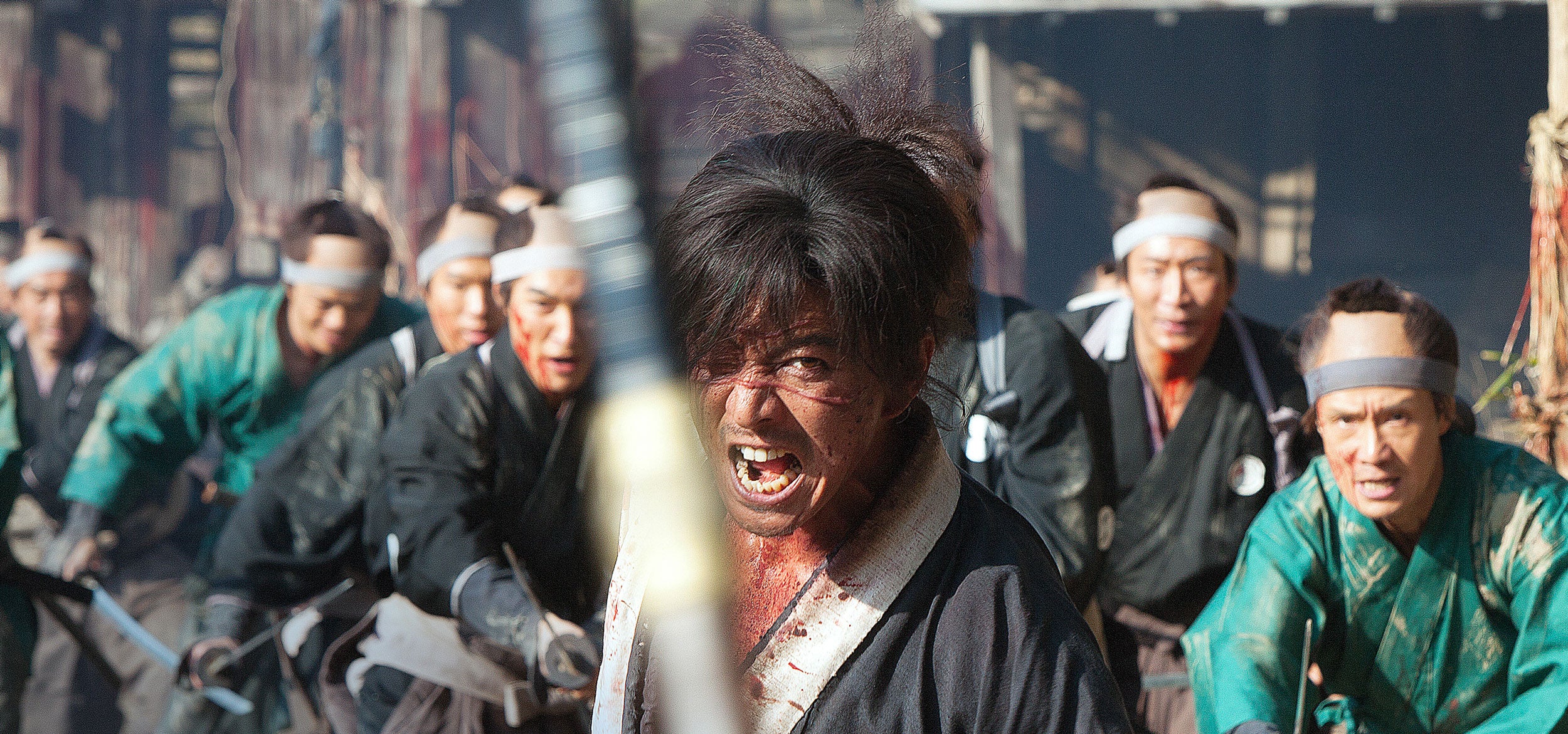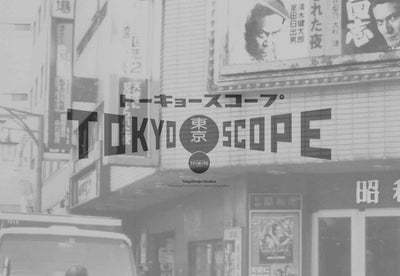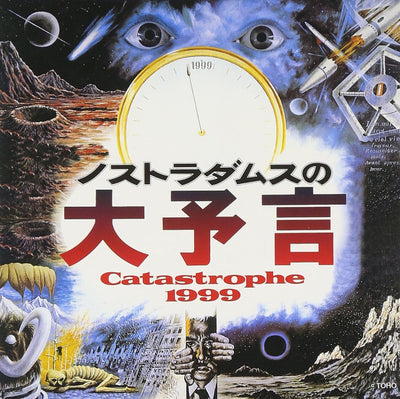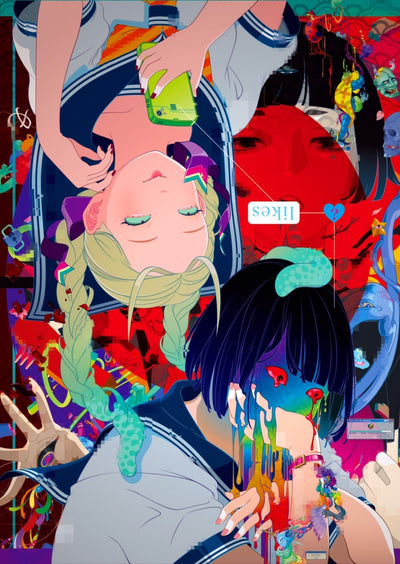Takashi Miike arrived in San Francisco on October 31, 2017 (Halloween!) for a screening of “Blade of the Immortal”, his 100th title as director. TokyoScope got a chance to talk to him about the film, which is based on the manga of the same name by Hiroaki Samura.

TokyoScope: When did you arrive in the USA?
Takahashi Miike: Just now.
I see! You must be tired! I heard that you are going to Los Angeles tomorrow. So you only have less than one day in San Francisco.
Yeah, that’s right. I need to attend a movie preview tonight (Oct. 31) in San Francisco.
The last time when I met you in San Francisco was right after 911 in 2001 (After Miike attended a competition in Canada, he got stuck in SF due to the events of September 11th), and there was another terrorist attack in New York today. It seems like every time you visit the US…
Yeah it seems like something always happens in NY whenever I visit the US.


I heard that the film Blade of the Immortal is your 100th movie. Do you have special feeling for this film?
No, I was not aware of that when I was making it. When I sent the film to Cannes, either the director or someone into movies counted my films, and realized that this was my 100th movie.
The film starts with killing 100 people with a sword. It was a coincidence. It was from the original work. It was a coincidence of my career and the original work.
You have directed many films over different genres. Have you ever rejected any offers?
As long as the timing works out, usually I accept the offer. Sometimes I don’t know the producer, or sometimes the budget is very tight or the film is in a totally new genre that I have no experience with, or even for TV dramas. Probably they watched my film or heard about me from other people while searching for a director, and they may have thought “Maybe Miike can do this job”. That to me is same as meeting an audience.
I had no idea that Blade of the Immortal would play in the US while making it. I did not think that people in San Francisco would watch this film today. It feels like the movie made its own way. Or in other words, the film created these circumstances.
For example, if a young student wants to make a movie, and he/she watched my movie, and asked me “Can you make my movie with this budget?” I may take up the offer if I have enough time, as I believe the film itself created the flow.
Of course, as a director, if we have our own plans and ideas, we will inevitably engage in works focusing on those things, but I feel, when we do that, we lose the opportunities of natural flow. I don’t have that much ambition (laughs), so most of the time, I go with the flow. That’s actually very Japanese.
However, when I look at other senior directors, I notice that they have very strong opinions since before making their films. They would say “I am this kind of director, therefore I cannot make my film with a low budget or such a schedule”, and they make choices before making the films. On the contrary, the films are my life, so I try not to choose as much as possible.
In the past, I often received very low budget offers. Back then, I was already working for low budget films, but the offers that came to me were even much lower in budget, so it must be ridiculous compared to American standards. It was a super micro budget offer (laughs).
Even by Japanese standards, the budget was small, and people would say “How can you make a film with such a tight budget?” or “Is that for one actor’s paycheck?” Even with such a tight budget, when the person seriously said “This is my proposal, and I want to make this kind of movie”, I could see things that were beyond my common sense, and I could try different methods that I have never tried before, and as a result, I could make a unique film with lots of freedom. I did not have money for those projects, but it was very fun. I also met people and actors who said to me “If this is so much fun, you don’t need to pay me a lot”.
Maybe after this, you will receive even more unexpected offers from independent films or internet streaming services.
Yeah, we never know what will happen. We should meet more people through the films, but movie people are quite closed.
You mean people in the movie industry?
Yes. They also consider whether the offer is suitable for their career. Of course it’s understandable that they consider if the job has value for their career. I can understand that, but for me, I have nothing much to protect (laughs).
In terms of film making in Asia, I receive offers from China now.
Yes, I heard that the film industry in China is growing. It seems like there is lots of potentials.
China has been loosely suppressed. Although they don’t say it out loud, they are seeking something very strongly. They “want to change”. However, they cannot say it, and won’t say it. Instead, you can feel such that sentiments in the films, and that is very good. They also have lots of money.
I’m sorry for not doing the research, but have you already made films in China?
Yes, I’m preparing to make one now. But I don’t know how it will turn out. In Japan, when the job progresses that much, we will start shooting the film, but in overseas, we never know what will happen next. However, it has been progressing quite well.
(Editorial note: In 2017 summer, Miike announced that he will make a movie with Chinese action legend, Sammo Hung.)
Blade of the Immortal is based on a manga, and you also made Yatterman (based on an anime) and Like a Dragon (based on the Yakuza video games). Is making this kind of film different from making your own original movies?
Miike: Hmmm,,, it depends on the individual, but for my generation (Miike was born in 1960, Age 57), manga represents a lot of dreams. After the war, each family bought a small television for their home. There were also many movie theatres. However, manga was the best entertainment that children could afford with their pocket money.
People in our generation have a lot of respect for manga artists. No matter which house I went, including classmates’ houses, there was always a book called “How to become a manga artist” (laughs). Becoming a manga artist was my childhood dream, and I have special feelings about manga.
Now in Japan, many movies are made based on manga. The producers are from our generation, and you can feel the love and unique emotions that are different from other countries’ culture. Compared to novels, they feel manga is much closer and “belongs to” them.
It’s also very easy to make a film from manga. However, in terms of expression, manga is quite looked down upon. But that’s also what makes manga good.
Is it because of how manga penetrates into people’s lives?
Although manga has its own unique way of expression, the level of sophistication is not much different from that of Shakespeare.
For us who grew up with manga, that’s what I feel. When I make films based on manga, I notice details that I was not aware of when I was reading the manga. So it is important that I do not disappoint or sadden the manga artist when he/she sees the film that I made. That’s the only thing I need to ensure, and the rest is actually quite easy.
Once I meet and talk to the artist, I know his/her personality, and when I read his/her manga, I know what is important for him/her. However sometimes what the manga artists think is important can only be expressed in manga. When I try to show that in movies, the investors are not happy. But we need to make movies under different circumstances, so it is important that the manga artist feels “This is interesting. This film is definitely based on my manga”.
It is good that we have clear idea who will be the target audiences when making a film out of manga. When making my own movies, all I need to do is to find answers within myself, but also, I need to think “will the audiences like this film?” Although this is very important as a result, whether the audiences like the movie or not will be revealed after the movie is made. I do not want to compromise when making a movie. Maybe out of several films that I made, audiences will like one of them, but that’s not my purpose. However this kind of mindset is very dangerous for investors (laughs).

One of the producers of Blade of the Immortal is the famous Jeremy Thomas, and this is 3rd time that you are collaborating with him following 13 Assassins and Hara-Kiri: Death of a Samurai. What kind of person is he? What brought you to work with him?
He is a very rare producer for Japanese directors. He is a British producer, and although he has collaborated with difficult world class directors, such as Bernardo Bertolucci and David Cronenberg, he has respects for Japanese directors. He aims to establish cult recognition rather than targeting a mass audience hit.
You can’t work like that, if you don’t like the film or the director. He doesn’t only work with the film, but rather he works with the person who made the movie. For example, he made movies together with Nagisa Oshima and Takeshi Kitano (It seems like he didn’t work very long with Takeshi Kitano). When working on my films, every time he came to Japan to meet with me and also to visit the filming site.
Did he also come to Kyoto for Blade of the Immortal?
Yes, he came to Kyoto, and also Yamagata. He also came to do the editing with me. In addition, what’s very helpful is that he has an editing background and he knows the filming side of things very well, and he has his own way of doing things. When he worked with Mr. Oshima, he followed up with him to get through the project. Jeremy really likes Mr. Oshima. That’s why he wanted to watch Mr. Oshima’s movie. If a producer pushes his opinion too much, it is no longer Nagisa Oshima’s movie. Therefore, he gave his support by cooperating and giving advice to the director from the mindset of “Mr. Oshima might be thinking this way”. He has a magical charm.
Is he like a navigator? Navigating the producer to maximize his talent?
Yes. He navigates, and he wants to see movies made by directors. Then he introduces the movie to other people. You won’t find many producers like that.
The way we met was not that I went to see him. When I was at the Venice International Film Festival, I was told that Jeremy Thomas wanted to talk to me if I had time. I was like “Jeremy Thomas wants to see me?” It was after Audition so it was around 15 years ago. I met him at the hotel lounge and exchanged names and a brief introduction. We didn’t need to introduce each other that much, because we already knew each other (laughs).
So, what I already knew was enough. We didn’t need to say “I am so and so”. How the other person sees me, is his/her perception of me. We didn’t need to introduce ourselves to each other that “I am actually this kind of person”. We only said “nice to meet you”, and straight away, started talking about collaboration (laughs).
I thought he was very cool, as he had a novel written by an old Japanese author when we met. It was Junichiro Tanizaki.
I can only speak Japanese, and Jeremy prepared a Japanese book for me and he said “This is for you”. Then he said “I already have the rights to make this film”. It was a book collecting two novels called “The Secret History of the Lord of Musashi and Arrowroot”. It is a book that even most Tanizaki’s fans don’t read. Jeremy said to me “I already acquired the rights to make this film, so if this is a good time for you, I hope you can make this film”.
Is it a historical drama?
It is a historical drama, but not about sword battles. It’s a perverted human drama. A very twisted.
Talking about Blade of the Immortal, when you made 13 Assassins, Goro Inagaki, a former member of Japanese male idol group, SMAP, appeared in the film, and I heard that Takuya Kimura, another SMAP member, was feeling envious about it. This time, Kimura played the main character in Blade of the Immortal. How was he as an actor?
He is really special. He is a really super idol. I believe it was his fate to play the role of the main character Manji. They are very similar. They both have gifts that other people cannot have, such as the power of immortality.
Takuya Kimura has been a major idol for the last 25 years, and it is a dream for a young people. The common ground for them is loneliness. For example, Kimura cannot even go shopping. Of course, he cannot even go to convenience stores either. He has been living such a life for a long time now. But one thing that is very special and different about him is that, among other SMAP members, he is the only one who has family. His encounter with his wife must have been very significant. He also has two kids and he is sending them to study abroad. He is a father. But he doesn’t show that at all. His family saved him from loneliness. I feel he is very close to Manji.
For me, Manji is immortal, and he lives on even after this movie. He survived World War II, and even now he is living in somewhere in Japan. I don’t know which part of the Japan, though. He must have gone through plastic surgery to change his face (laughs).
When I think "What is Manji doing now?” I think of Kimura. He healed his wounds, and playing the role of a super idol as if nothing had happened (laughs).
Kimura is a very special person. He makes me feel that way. It’s very interesting.

The Kabuki actor Ebizo Ichikawa (who also stars in Blade of the Immortal) has the same quality too. I like him very much. He also has something very unique. He succeeded Naritaya (a guild of Kabuki actors) that has hundreds of years of history. Although the pure bloodline has been lost, he is someone who has a special fate in a long history. That is very unique as a human being.
Some people say both Kimura and Ichikawa are difficult to deal with, but that’s normal. They both have unique backgrounds, and if they still act like average people, that’s very abnormal. That would be a big lie.
An average people may say that Kimura and Ichikawa are arrogant, but that’s because they are both honest. They say what they want to say.
For them, they are just doing normal things. I am very attracted to that. I get to work with such unique people, and in addition to that, Jeremy is the producer. That’s how people are connected. No matter how I think about it, this was not done by my own ability. The movies exist by my meeting with many people. But it seems like Jeremy has misunderstanding in my talent (laughs).
No, that’s not true! (laughs)
But I’m fine with his misunderstanding. I don’t need to tell him “maybe you are over evaluating me” (laughs).
Maybe he sees something in me that I don’t see myself. Jeremy can draw that out of me.
Offers come from many directions. That’s the same for TV dramas. Through relationships with other people, opportunities come.
The music in Blade of the Immortal is by MIYAVI, a very famous musician in Japan as well as overseas.
Kimura and MIYAVI acknowledge that they are on good terms. MIYAVI is not acknowledging Kimura as an idol but…
Kimura is more than just a super idol. He is a top level entertainer.
Yes, he is amazing. Really amazing.
In addition to the coincidence that this is your 100th movie, it feels like meeting with Jeremy, the fact that Kimura played the role of Manji, and many other coincidences have made this film a reality.
Yes. But I don’t think that’s why I must be very careful or worried about failing. Although I am doing my best, this film has many imperfections, too. Perfect entertainment is not possible for movies. In the end, I want audiences to like the movie, including its imperfections. Otherwise, my job just becomes about eliminating imperfections. When that happens, film making itself becomes boring. So it is okay for the imperfections to stay imperfect.
Find the nearest theaters and buy thickets from here.
















